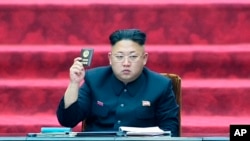Frequent leadership changes within the North Korean military is causing some to question if the Kim Jong Un regime is still unstable.
Pyongyang’s state-run news agency on Wednesday referred to Hyon Yong Chol as minister of the People’s Armed Forces, replacing Jang Jong Nam, who held the position since May of last year.
This is the fourth time the holder of this position has been changed since Kim assumed power at the end of 2011.
Bruce Bennett, a senior defense analyst at the RAND Corporation, told VOA such frequent leadership shake-ups are a change from his father, Kim Jong Il, who replaced his defense minister only three times during his 17 years in control.
“One has to anticipate he is not satisfied with the individuals he is putting in place, that they are not doing at least some of the things he wants them to, and therefore he’s changing and trying different people. And that suggests a degree of instability," said Bennett.
Ralph Cossa, president of the Pacific Forum CSIS in Hawaii, concurred with Bennett.
“My own guess is that he is still not quite secure in his control and he feels it’s necessary to bring in his own people. Certainly once he removed his uncle, that showed he was no longer relying on his father’s advice or the people he left behind,” said Cossa.
Bruce Bechtol, a professor at the Texas-based Angelo State University, voiced a similar perspective and said this is because Kim still does not have a “stable power base” within the military.
Some view the frequent reshuffling as a natural process for a new leader coming into power.
Ken Gause, a director at the Center for Naval Analysis in Virginia, said the reshuffle could be serving a political purpose.
“I think part of it is due to the power consolidation process, the desire to keep the high command somewhat off-guard, to not allow anyone to get too comfortable in their positions,” said Gause.
Kim Jong Un has made numerous changes to his government since becoming North Korea's supreme leader in 2011. The biggest took place last year when he had his uncle and second in command, Jang Song Thaek, executed.
This report was produced in collaboration with the VOA Korean service.












